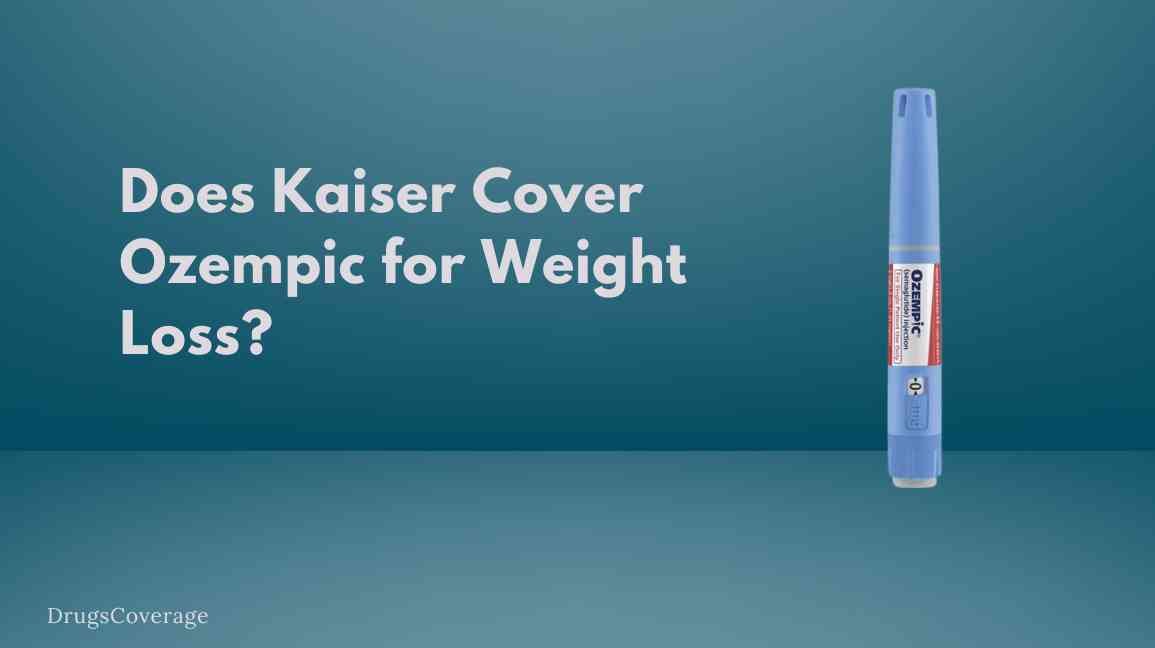In recent years, Ozempic, a medication originally approved for the treatment of type 2 diabetes, has gained attention for its weight loss benefits.
This has made lots of people think about whether their insurance covers the drug, especially if they have insurance with Kaiser Permanente. Understanding the intricacies of health insurance policies and coverage options can be challenging.
In this article, we will explore the details of Kaiser Permanente’s coverage of Ozempic, specifically in the context of weight loss. We aim to provide clarity on eligibility, coverage limitations, and how to approach your physician about this medication.

What is Ozempic?
Ozempic, known generically as semaglutide, is an injectable prescription medication that belongs to a class of drugs called GLP-1 receptor agonists. Approved by the FDA for managing type 2 diabetes, Ozempic helps your body make more insulin and reduces blood sugar levels.
Interestingly, a notable side effect observed in clinical trials and user experiences is significant weight loss. This is because semaglutide makes your stomach empty slower and reduces your hunger. When you eat fewer calories, you can lose weight.
Given these benefits, Ozempic has not only become a focal point for people seeking diabetes management but also for those aiming for weight loss, including those who may not necessarily have diabetes.
How It Works
Ozempic works by mimicking a hormone called glucagon-like peptide-1 (GLP-1) that affects the brain areas involved in appetite regulation. Stimulating the release of insulin when blood sugar levels are high, not only helps in lowering blood glucose levels but also slows gastric emptying.
This action makes you feel fuller longer, thereby reducing your overall calorie intake which can lead to weight loss. This dual action makes Ozempic an attractive option for managing type 2 diabetes and, as an off-label use, for aiding in weight loss.
How much does Ozempic cost with or without insurance?
The cost of Ozempic can vary significantly depending on whether you have insurance coverage and the specific terms of your insurance plan. Generally, with insurance, patients may expect their costs for Ozempic to be reduced to a co-pay that can cost as little as $25 for a monthly supply
Without insurance, the cost of Ozempic can be quite high, averaging around $800 to $900 for a month’s supply at retail price. It’s worth noting that these are average prices and can vary by location and pharmacy.
Patients considering Ozempic for weight loss should also check out patient help programs from Novo Nordisk, the company that makes Ozempic. These programs might offer the medicine at a lower price or even for free to people who qualify.
Does Kaiser Cover Ozempic for Weight Loss?
Yes, Ozempic is covered under the prescription drug benefit for weight loss, but it’s only for Kaiser Permanente members in the Northwest region who already have coverage for weight loss meds.
This means that people in this specific group can use Ozempic as part of their weight loss treatment with their prescription drug coverage. This could make it easier and cheaper for them to get.
If you’re a Kaiser Permanente member without coverage for weight loss meds like Ozempic, you can get it at the member price. Check with Kaiser Permanente’s Pharmacy Services to know what weight loss meds are covered in your area. This will help you understand your benefits and costs for Ozempic.
Eligibility Criteria for Kaiser Coverage

Each health plan can set its criteria for coverage of medications. Members should be aware of what their health plan categorizes as appropriate use and the process for obtaining coverage.
Criteria for Initiating Treatment (New Start)
Formulary semaglutide (Ozempic) is covered under prescription drug benefits when specific conditions are met.
- Have Type 2 Diabetes Mellitus and Clinical Atherosclerotic Cardiovascular Disease (ASCVD)
- Absence of personal or family history of medullary thyroid carcinoma (MTC) or Multiple Endocrine Neoplasia syndrome type 2 (MEN 2)
- Being on the maximum tolerated dose of metformin or facing intolerance or contraindication to metformin (including both metformin IR and XR)
- Intolerance or contraindication to an SGLT-2 inhibitor (e.g., Jardiance)
OR
- Diagnosis of Type 2 Diabetes Mellitus (approved for 12 months)
- Absence of personal or family medical background involving medullary thyroid carcinoma (MTC) or Multiple Endocrine Neoplasia syndrome type 2 (MEN 2)
- Being on the maximum tolerated dose of metformin or facing intolerance or contraindication to metformin (including both metformin IR and XR)
Initiation (new start) criteria for chronic weight management
Non-formulary semaglutide (Ozempic) will be paid for on the prescription drug benefit for 4 months if:
- You have insurance that covers weight loss meds
- You’re diagnosed with chronic weight management
- You’re 18 years or older
- Your current weight and BMI are noted when semaglutide (Ozempic) is prescribed
- You’re on a diet and exercise plan
- BMI > 30 kg/m2 or BMI > 27 kg/m2 AND have at least one of these conditions: hypertension, Diabetes, Hyperlipidemia
Criteria for members who are already taking the medication but have not been reviewed before (such as new members):
Semaglutide (Ozempic) will be included in the prescription drug coverage when certain conditions are fulfilled:
- Diagnosis of Type 2 Diabetes Mellitus with Clinical Atherosclerotic Cardiovascular Disease (ASCVD)
- Diagnosis of Type 2 Diabetes Mellitus without ASCVD
- Patient has a prescription drug insurance that includes weight-loss medications; AND Patient uses it for long-term weight management.
Criteria for continued use in Type 2 Diabetes without diagnosed ASCVD
Ozempic (formulary semaglutide) coverage for 12 months if:
- A1c at goal or dropped by 0.5%+ from baseline before GLP-1 therapy, unless on certain insulin doses or pediatric.
- New members on GLP-1 therapy must:
- Maintain glycemic control near goal.
- If A1c >2% above goal, must drop by 0.5% unless on certain insulin doses.
- Adherence (>80%) to prescribed diabetes meds.
Ongoing criteria for use (4 months after starting and then annually) for managing chronic weight issues.
Ozempic (non-formulary semaglutide) stays covered for 12 months on prescription if:
- Patient’s recent weight and BMI are recorded
- Patient has lost >5% weight in the last 16 weeks (reviewed once) or maintains >5% weight loss thereafter (reviewed every 12 months)
You can check out these eligibility criteria in detail at Kaiser Permanente Criteria-Based Consultation Prescribing Program
Also Read: Does Kaiser Cover Zepbound for Weight Loss?
Factors That Determine the Coverage
Many things decide if Ozempic gets paid for by insurance, especially with Kaiser Permanente or similar healthcare. Knowing this can help patients figure out how to pay for it.
- Insurance Plan Type: The kind of insurance you have decides if they cover Ozempic. Plans with good prescription drug benefits usually cover it, especially for Type 2 Diabetes and weight management.
- Geographical Location: Coverage changes depending on where you live. For example, Kaiser Permanente members in the Northwest get different benefits for Ozempic than members in other areas.
- Clinical Indications: Why the doctor prescribes Ozempic matters for insurance coverage. Plans usually pay for it if it’s for FDA-approved uses like Type 2 Diabetes or sometimes for weight management.
- Patient’s Medical History: If you or your family had certain health issues, you might not get Ozempic. It’s not given to patients with medullary thyroid carcinoma (MTC) or Multiple Endocrine Neoplasia syndrome type 2 (MEN 2).
- Prior Authorization Requirements: Some insurance plans need approval before covering Ozempic to make sure it’s prescribed correctly.
- Participation in Weight Management Programs: If you need Ozempic for weight management, you might have to join a weight loss program with diet and exercise.
- Cost Assistance Programs: If you don’t have insurance or it’s expensive, you could get help from Novo Nordisk or other groups to pay less for Ozempic.
Alternatives and Considerations
When exploring alternatives to Ozempic or considering its use, patients and healthcare providers should weigh several factors:
Availability of Similar Medications:
- Other GLP-1 receptor agonists (e.g., Victoza, Trulicity) may offer similar benefits. Each has its own efficacy and side effect profile.
- SGLT-2 inhibitors (e.g., Jardiance, Farxiga) are another class of medications used for Type 2 Diabetes and have benefits in heart disease and weight loss.
Insurance Coverage Variability:
- Coverage for alternative medications can vary significantly between insurance plans. Always verify coverage and out-of-pocket costs.
- Manufacturer or third-party financial assistance programs may be available for these alternatives.
Individual Health Considerations:
- Medical history, potential side effects, and personal health goals should guide medication selection.
- Patients with specific contraindications for Ozempic might find alternatives more suitable.
Lifestyle Modifications:
- In addition to medication, lifestyle interventions like diet changes, increased physical activity, and weight management are crucial.
- Participation in structured weight management programs may enhance treatment effectiveness, regardless of the medication used.
Consultation with Healthcare Providers:
- It’s essential to involve healthcare providers in discussions about medication options to ensure that treatment decisions are informed by up-to-date clinical guidelines and personal health needs.
Conclusion
Choosing the right treatment for Type 2 Diabetes or weight management can be complicated. However, understanding your options, whether it’s Ozempic or another medication, and knowing how your insurance works makes it easier. Remember, it’s not just about the medication. Diet, exercise, and a healthy lifestyle also play key role in managing your health. Always talk to your healthcare provider to make sure you’re on the best path for your health goals.
FAQ
Does Kaiser cover semaglutide for weight loss?
Yes, Kaiser Permanente covers semaglutide for weight loss, but specific eligibility criteria must be met, including the patient having a prescription drug insurance that encompasses weight-loss medications and using it for long-term weight management.
What are the main considerations for Ozempic coverage under insurance?
The main considerations for Ozempic coverage under insurance include the patient’s specific medical need (like Type 2 Diabetes or chronic weight management), the insurance plan’s prescription drug benefits, prior authorization requirements, participation in any required weight management programs, and the potential availability of cost assistance programs to help mitigate out-of-pocket expenses.
Is Ozempic covered for uses other than Type 2 Diabetes?
Yes, in addition to Type 2 Diabetes, Ozempic is also covered for chronic weight management under certain conditions. To qualify for weight management coverage, patients need to meet weight loss goals, join weight management programs, and follow treatment and health check-ups.
Does Kaiser Southern California cover Ozempic?
No, Kaiser Permanente in Southern California doesn’t cover Ozempic right now. According to their formulary, Ozempic is part of the prescription drug benefit for weight loss, but it’s specifically for Kaiser Permanente members in the Northwest region who already have coverage for weight loss medications.
Does Kaiser cover Ozempic for type 2 diabetes?
Yes, Kaiser Permanente does cover Ozempic for Type 2 Diabetes, but you need to meet certain requirements. You should have prescription drug insurance that includes diabetes meds and follow your healthcare provider’s instructions when using Ozempic. Make sure to check with your insurance about what’s covered and any costs you might have to pay.
